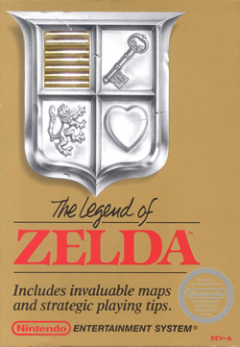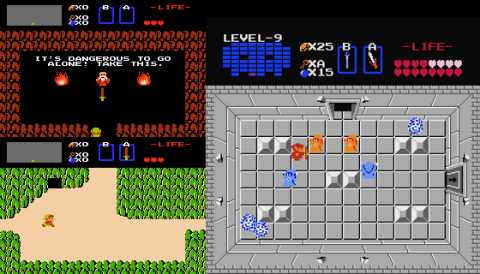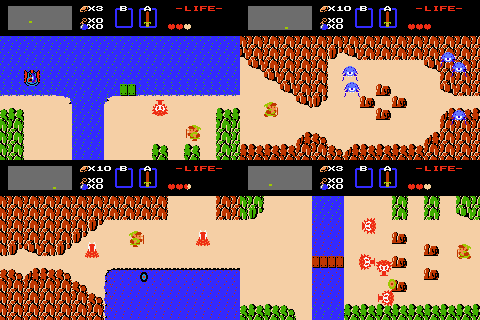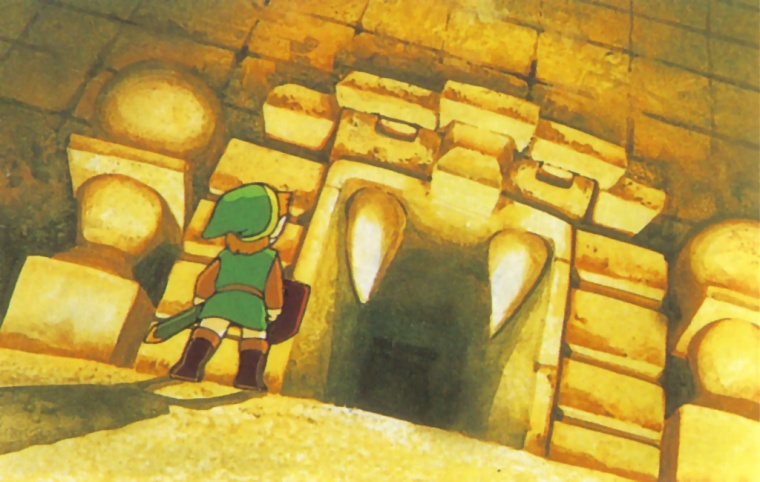The Legend of Zelda
| The Legend of Zelda | |
|---|---|
 |
|
| Platforms | NES, Gamecube, Game Boy Advance, Virtual Console (Wii, 3DS) |
| Genre | Rap-inspiring Adventure |
| Score | 8  |
Achievement Unlocked: Review a game older than you.
Zelda may be the most beloved video game franchise, but I've never counted myself among series super-fans. Since cutting my teeth on the series with Ocarina of Time, I've merely enjoyed the major games in the series. Don't get me wrong, they're all great, but I wouldn't put any in my top ten.
That said, I like checking out each title and comparing it with the rest of its ilk. Other than the experimental black sheep Zelda II: Adventure of Link, the first Legend of Zelda may be the series' most divisive game. Fans can't seem to agree whether the game's old school difficulty and unguided progression make it dated or just different. Lacking an in-game overworld map and never funneling players away from difficult areas, the NES original certainly requires more of its players than any Zelda since.
Nintendo recently launched its 3DS Ambassador program, giving the system's early adopters ten free NES games. I had been meaning to check out several of the ambassador titles, but none more so than The Legend of Zelda. Fifteen hours and a princess rescue later, I'm ready to weigh in on the Dated vs. Different debate.
But first, you'll need the following in order to enjoy this game for the first time:
- An instruction manual/guide OR prior knowledge of Zelda mechanics
- An overworld map OR the willingness to make one yourself
- Patience OR inhuman video game skills
- Parents to help you hook it up
Born in an age before unskippable tutorials and regenerating health, The Legend of Zelda drops you into the thick of a dangerous realm armed only with a stylish green tunic-and-nightcap combo. From there, it's on you to find the eight pieces of the Triforce and rescue Princess Zelda from the evil Ganon in a land of colorful 8-bit sprites and a handful of memorable chiptunes. Your only clues will come from a dozen or so identical old men whose cryptic wisdom may or may not actually help. Those who don't already know the rules (bombs expose hidden passages, pressure tiles open secrets, each dungeon has an easily-skipped key item) will surely hit several frustrating roadblocks through the journey. I only made it through the adventure unassisted because I had played seven other Zelda games. There's no shame in checking GameFAQs when you simply can't see the way forward in this nebulous adventure, but the reward for finding your own way through this 8-bit maze of a game is hard to match.
Speaking of wayfinding, there are no sidekicks, signposts, or speedbumps to guide you toward key areas or away from obstacles beyond your skill level. This freedom to attack the quest in virtually any order endears it to those who relish exploring on their own terms, and it makes for one of the most replayable games of its era. I actually completed the third and fourth dungeons and stumbled upon the eighth before I even found the first one. However, the 128 screens that make up the winding overworld of Hyrule will quickly overwhelm those relying solely on a mental map. It wasn't long after The Legend of Zelda that in-game maps would become standard, filling out automatically as the player discovered new areas, and this is the case in the game's nine dungeons. But for the game's labyrinthine overworld, you will need to print out a map found online or, for the truly self-sufficient, draw one yourself. Those playing on the 3DS actually have a convenient tool in the 3DS Game Notes, where you can pause the game and sketch your own 16 x 8 map of Hyrule on the sixteen notecards available. It's a brief chore to pause the game and sketch each screen before moving on, but the result is indispensable and satisfying.
Behold my cartographic endeavor!
But for every space on your map, you'll have about a hundred treacherous foes to vanquish. Critics eagerly note the lack of challenge in modern Zelda's combat, but you'll find no such complaints here. I died at least fifty times at the hands of unpredictable wizards, deliberate knights, and three-headed dragons. Each new foe requires a slight change in tactics to escape unharmed, and doing so is crucial as enemies deal considerable damage and rarely drop health when defeated. That said, almost every fight in The Legend of Zelda can be won with skillfull stabbing, unlike later games in the series that require experimenting with various items in order to fell certain enemies.
You can even the odds by finding helpful items scattered in the dungeons and hidden in the overworld. New swords, defense upgrades, extra health, and new subweapons all bolster your chances of success. Finding them is easier said than done, though, as most are tucked away in staircases hidden underneath trees, statues, and even graves. A few rest in locations that may appear curious to those paying attention, and the cave-dwelling old men will give vague hints that point toward others, but it's unlikely that one will find them all without a keen eye and a bit of pyromania. I finished the game without the aid of a few health and defense upgrades, and considering how tough the final dungeons get, I doubt I could have finished with anything less.
But maybe you're a gaming god, and all you need to vanquish Ganon is a wooden sword and three hearts of health. You can essentially do just that, thanks to the open-ended approach to challenge. The self-scalable difficulty is one of the reasons The Legend of Zelda remains one of the most beloved adventure games of all time. You can handicap yourself as much as you want, even refusing to take up a sword, or you can seek out every aid available before steamrolling through all but the toughest tasks in the game. And when you finally rescue the princess, a second quest with tougher enemies and reworked level designs is waiting to be conquered.
So, dated or different, what's the verdict? I'll take the easy way out and say it's both. The coin-op era difficulty and mapless overworld simply would not happen in a game today, and for good reason: these things would alienate an enormous potential fanbase. However, those who finish the game with minimal help will earn pride that is rare in modern games and unmatched in the series. It's not a quest to take lightly, but the prepared and the devoted will find a timeless adventure with only a few troublesome quirks. I have a hard time choosing favorites among the Zelda games, and that trend will continue: The Legend of Zelda is just as great as its twenty five years' worth of worthy successors.




